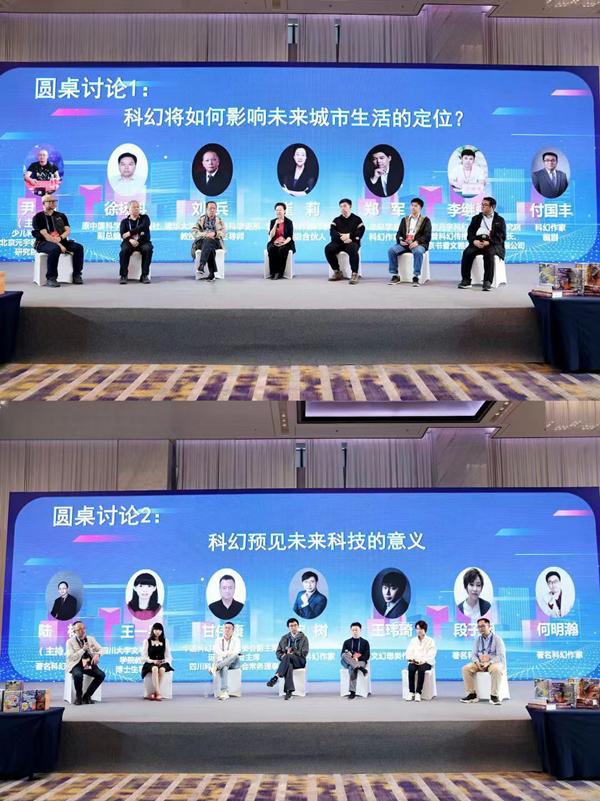Forum delves into sci-fi's role in shaping humanity's future
- By Zhang Rui
 0 Comment(s)
0 Comment(s) Print
Print E-mail China.org.cn, October 25, 2023
E-mail China.org.cn, October 25, 2023
A key forum took place in Chengdu, Sichuan province, during the recent 81st World Science Fiction Convention (Worldcon), delving into humanity's potential future and science fiction's role in shaping it.

China's sci-fi luminary Wang Jinkang delivers a keynote speech at a forum during the 81st World Science Fiction Convention (Worldcon) in Chengdu, Sichuan province, Oct. 21, 2023. [Photo courtesy of Beijing Yuanyu Science Fiction and Future Technology Research Institute]
Titled "Sci-fi Frontiers: A Forum on Exploring Science Fiction and The Development of Humanity," the Oct. 21 event gathered Chinese sci-fi creators, scholars, and industry professionals to discuss a singular theme: the relationship between science fiction and humanity's future development.
Yin Chuanhong, deputy secretary of the Chinese Writer Association of Science Popularization, said, "Science fiction opens a window to the unknown world." He elaborated on the creativity of sci-fi writers, emphasizing their ability to "inspire the public to explore, leading readers to cutting-edge science and technology."
Wang Jinkang, a towering figure in China's sci-fi community, echoed this sentiment. "With the rapid development of biotechnology and artificial intelligence, technology's impact has shifted from transforming the objective world to transforming humans themselves," he noted in his keynote address. "Science fiction can enlighten technological innovation, while scientific discoveries and technological advancements can also inspire the creativity of sci-fi writers."
But science fiction doesn't solely grapple with the technological aspects of the future. Wang Quangen, a professor at the School of Chinese Language and Literature at Beijing Normal University, explored the philosophical dimensions. He explained that sci-fi serves as a tool for humans to "imagine and think about the future," noting, "The significant value of sci-fi lies in inspiring us toward philosophical thinking, social responsibility, and the integration of scientific and literary thought."
Later in the forum, roundtable discussions were held. Two topics seemed to capture the spirit of the age: the future of urban living and science fiction's role in forecasting technological shifts.
One theme explored the evolution of urban life. As cities expand and technology becomes increasingly woven into our daily routines, questions arise about the trajectory of urban living. Liu Bing, a professor at the Department of the History of Science at Tsinghua University's School of Humanities, described the ideal city as one that "serves people and makes life more comfortable and better." He believes the scenarios presented in sci-fi works are diverse, offering various visions for the future.
The discussions took a speculative turn with insights from sci-fi writer and screenwriter Fu Guofeng, who posited the emergence of cities in unprecedented locations — underground, under the sea, or even in outer space. "Each will produce a culture different from land cities," he said. In these potential future urban landscapes, the vast web of data and interconnected lifestyles would necessitate the embrace of AI for management. However, he noted, "The responsibility for decisions made by AI involves ethical issues."
Cui Li, a senior partner at the Beijing-based Jingshi Law Firm, pointed out that the emergence of AI technology has made copyright protection for science fiction works more challenging. Cui called for governments at all levels to strengthen communication with sci-fi industry professionals and promote the formulation of relevant laws, regulations, and policies.

Sci-fi writers, expert scholars, and industry professionals join two panels of roundtable discussions during a forum held during the 81st World Science Fiction Convention (Worldcon) in Chengdu, Sichuan province, Oct. 21, 2023. [Photo courtesy of Beijing Yuanyu Science Fiction and Future Technology Research Institute]
The second roundtable discussion, titled "The Significance of Science Fiction in Foreseeing Future Technology," was no less compelling. Gan Weikang, vice-chair of the Chinese Nebula Awards Organizing Committee and president of EV/SFM, championed inclusivity in the sci-fi domain, pushing for "more manpower, capital, and resources to participate and expand its audience."
Sci-fi writer Baoshu provided a bridge between technology and fiction, emphasizing that science fiction simulates the model of future technology, helping us face future challenges with a positive mentality. Fellow writer Duan Ziqi suggested that regardless of a work's technological narrative, it invariably returns to the human experience, hinting at an "infinitely possible future." In a poignant reflection, He Minghan described science fiction as an art form not just designed to predict the future, but also to "evoke emotional resonance" and prepare us for potential challenges.
Subsequently, the forum's attendees also promoted the second Science Fiction Planet Award. This award was initiated by four science fiction industry insiders: Wang Jinkang, Liu Cixin, Wu Yan, and Frant Gwo. Currently, in its solicitation process, the award has established four categories: the Technology Award, the Literature Award, the Work Award, and the Contribution Award. Under these categories are numerous sub-awards, with a total prize pool of 6.65 million yuan. ($910,000).
With the Chengdu Worldcon having concluded, the global sci-fi community is now setting its sights on Glasgow, which is slated to host next year's Worldcon. The 2025 Worldcon will be held in Seattle, as decided by a vote in Chengdu.
Wang Weiying, director general of the Beijing Yuanyu Science Fiction and Future Technology Research Institute, reflected on the broader significance of the Chengdu Worldcon. She viewed the event as a "milestone" that symbolizes China's growing integration with the global science fiction community. "Chengdu, a city with a rich cultural identity, provides this international event with a distinct ambiance," Wang observed. She hoped that this unique gathering would serve as a platform to showcase the dynamism of Chinese sci-fi to the world.






Go to Forum >>0 Comment(s)